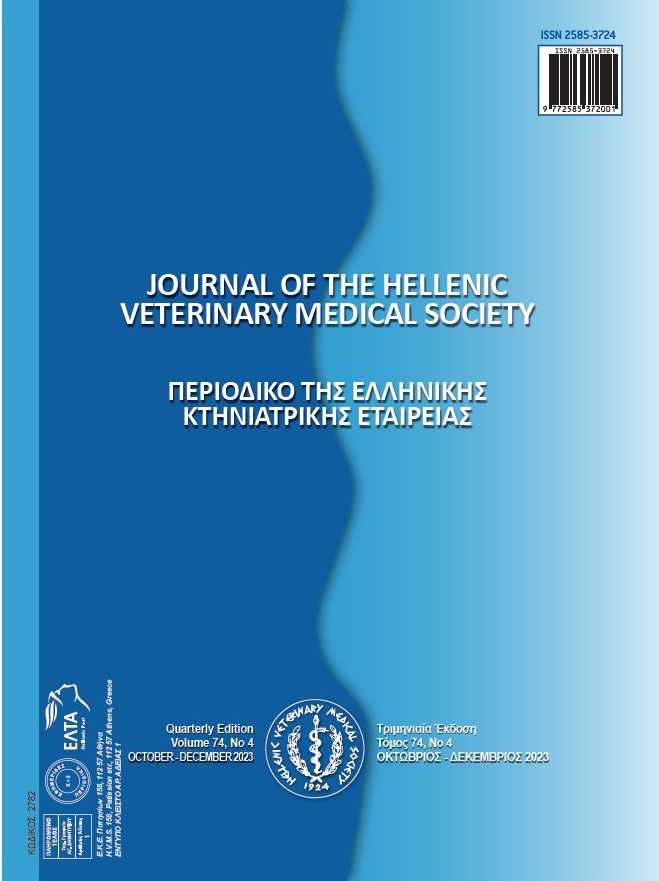Genotypical Determination of Vancomycin-Resistant Enterococcus faecalis and Enterococcus faecium Species Isolates fromBuffalo Milk and Dairy Products Vancomycin-Resistant Enterococcus faecalis and Enterococcus faecium
Περίληψη
In this study, Enterococcus faecalis and Enterococcus faecium were isolated in raw buffalo milk and products in local markets and supermarket in the province of Samsun. E. faecalis and E. faecium species and VanA and VanB gene presence were identified from confirmed Enterococcus spp. isolates with PCR method, resistance profile of vancomycin was found phenotypically and the MIC value was determined with E-test method. Enterococcus spp. was isolated from 60 (40%) of the 150 samples analyzed. In terms of serotype distribution, 28 (32.9%) isolates were identified as E. faecalis, while 41 (48.2%) were identified as E. faecium. Seven isolates were identified as positive in terms of VanA and VanB gene presence. One E. faecium isolate obtained from milk sample was found to have a vancomycin MIC value of ≥4 mg/l, 2 E. faecalis isolates obtained from cheese samples were found to have MIC values of ≥16 mg/l and ≥32 mg/l, 2 E. faecium isolates obtained from cream samples were found to have MIC values of≥2 mg/l and ≥2 mg/l, and 2 E. faecium isolates obtained from ice cream samples were found to have MIC values of≥4 mg/l and ≥16 mg/l. As a result of this study it was concluded that producers and consumers should be made conscious about complying with the cold chain parameters in transportation and storage processes, especially milking hygiene, and about minimizing the errors that will cause contamination caused by personnel and technological processes resulting from production.
Λεπτομέρειες άρθρου
- Πώς να δημιουργήσετε Αναφορές
-
Düztaşlar, S., & Gücükoğlu, A. (2024). Genotypical Determination of Vancomycin-Resistant Enterococcus faecalis and Enterococcus faecium Species Isolates fromBuffalo Milk and Dairy Products: Vancomycin-Resistant Enterococcus faecalis and Enterococcus faecium. Περιοδικό της Ελληνικής Κτηνιατρικής Εταιρείας, 75(1). https://doi.org/10.12681/jhvms.34337
- Τεύχος
- Τόμ. 75 Αρ. 1 (2024)
- Ενότητα
- Research Articles

Αυτή η εργασία είναι αδειοδοτημένη υπό το CC Αναφορά Δημιουργού – Μη Εμπορική Χρήση 4.0.
Οι συγγραφείς των άρθρων που δημοσιεύονται στο περιοδικό διατηρούν τα δικαιώματα πνευματικής ιδιοκτησίας επί των άρθρων τους, δίνοντας στο περιοδικό το δικαίωμα της πρώτης δημοσίευσης.
Άρθρα που δημοσιεύονται στο περιοδικό διατίθενται με άδεια Creative Commons 4.0 Non Commercial και σύμφωνα με την άδεια μπορούν να χρησιμοποιούνται ελεύθερα, με αναφορά στο/στη συγγραφέα και στην πρώτη δημοσίευση για μη κερδοσκοπικούς σκοπούς.
Οι συγγραφείς μπορούν να καταθέσουν το άρθρο σε ιδρυματικό ή άλλο αποθετήριο ή/και να το δημοσιεύσουν σε άλλη έκδοση, με υποχρεωτική την αναφορά πρώτης δημοσίευσης στο J Hellenic Vet Med Soc
Οι συγγραφείς ενθαρρύνονται να καταθέσουν σε αποθετήριο ή να δημοσιεύσουν την εργασία τους στο διαδίκτυο πριν ή κατά τη διαδικασία υποβολής και αξιολόγησής της.



